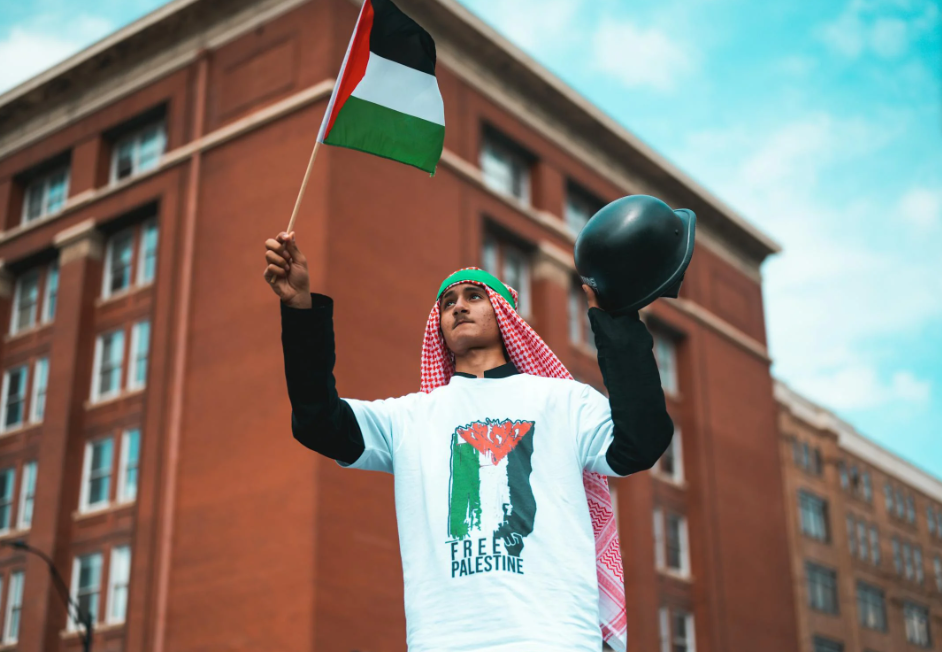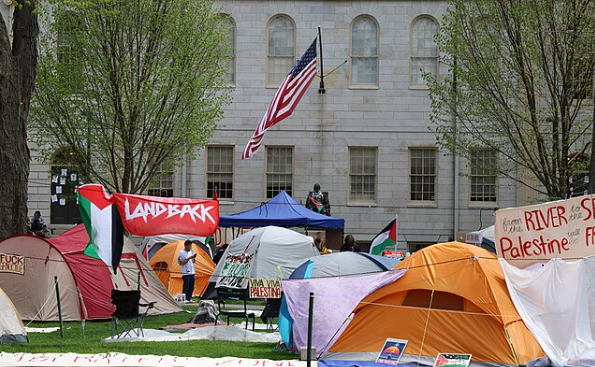A Free Speech Battleground: Harvard, Palestine, and Anti-Arab Bias

By: Ramsey Zeidan / Arab America Contributing Writer
Since the events of October 7th, 2023, student protestors have clashed with campus administrations, police, and governors while petitioning for their universities to divest from Israeli companies or fight for a ceasefire in Gaza. These protests have not been without consequence. Across college campuses in America, anti-Arab sentiment is at an all-time high. Palestinian university staff along with Arab and Muslim students have received death threats, and surveys demonstrate that college campuses are growing unsafe for Arab students. Anti-Arab incidents have received widespread media coverage but haven’t led to colleges ensuring the safety of students and staff. Overall, public scrutiny has largely been focused on Ivy League schools, but Harvard is at the center of attention.
“It’s really hard when it’s your family that matters less.”
Just last month, Harvard University’s Presidential Task Force released a 222-page comprehensive report on “Combating Anti-Muslim, Anti-Arab, and Anti-Palestinian Bias”. The report featured staff and student testimony, a college-wide survey, and recommendations from the task force to create a safer environment for Arab students. Though it is difficult to differentiate between Islamophobia and Anti-Arab bias, the report makes it clear that Arabs feel uncomfortable, threatened, and silenced. In fact, over 90% of Muslim students at Harvard said they fear repercussions simply for expressing their political views. The task force reported that members of the Arab community, especially those who are pro-Palestinian, feel that Harvard has been suppressive and unforgiving. As an anonymous student in the report puts it, “The feeling over and over again for Palestinians is that their lives don’t matter as much. Sometimes it’s explicit. It’s really hard when it’s your family that matters less.”
This report comes after a tumultuous academic year at Harvard where several students have been doxxed or had their degrees withheld. The 2023-2024 year was even worse, as “doxxing trucks” plastered with the faces of pro-Palestine students paraded around campus and throughout Boston. Additionally, Harvard has been locked in a legal battle with the Trump administration. Trump has already attempted to strip funding from Harvard over their lack of action on antisemitism. In April, he threatened to pull over $9 billion if Harvard did not overhaul their leadership structure and hiring process to combat DEI. Recently, a federal judge blocked a Trump decision to block Harvard’s ability to enroll international students. As the school’s legal battle with Trump rages on, pro-Palestine members of the community are stuck in the crossfire. There are two forces at work: Harvard’s apparent anti-Arab bias, and President Trump’s anti-Palestinian agenda. Harvard is becoming a battleground.

The Palestine Exception and Collective Action
Although the battle at Harvard is concerning, what’s more alarming is the implications for higher education across the country. The Trump administration understands Harvard’s importance as a symbol of excellence in higher education. It seeks to make an example out of Harvard to demonstrate to other universities what happens if they don’t fall in line with the administration’s agenda. As evidenced by testimony in the Harvard report, the school is already restrictive of pro-Palestinian speech, and the President’s attempts to limit it even further is arguably unconstitutional. This phenomenon is known as the Palestine Exception to Free Speech. According to Palestine Legal, the “Palestine Exception” is a documented pattern of behavior meant to silence pro-Palestine activists, and it is a fundamental violation of the 1st amendment. To attack this at the source, students, professors, Arabs, and anyone who is pro-Palestine must call out enforcements of the Exception. Allowing this behavior from governments or schools is the main driver of anti-Arab sentiment Harvard wishes to rid itself of. Whether it’s Harvard or other campuses, administrations must be relentlessly petitioned until change is made.
Ultimately, the Palestine Exception and problematic behavior from higher education institutions across the U.S. reveals a deeper pattern. Pro-Palestine activists face an uphill battle as exemplified by the Harvard report and the environment created by the Trump administration. Moving forward, students must unite themselves in collective action to protect each other against this free speech crackdown and stop anti-Arab bias in its tracks.
Want more articles like this? Sign up for our e-newsletter!
Check out our blog here!








